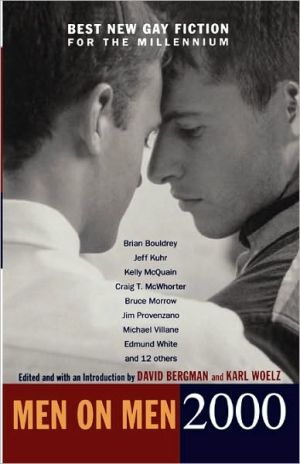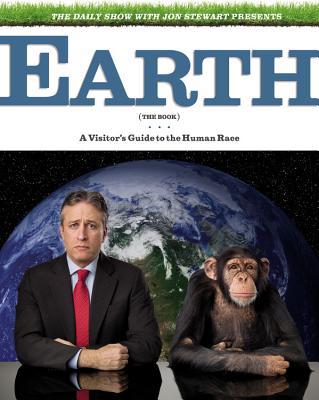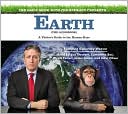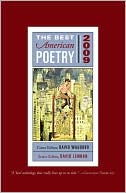Men On Men 2000
"Rarely has . . . a series [been] so consistently strong. Men on Men has regularly yielded a trove of well-wrought gay-themed short fiction."-Publishers Weekly (on Men on Men 7)\ \ Now spanning eight volumes and two decades, the Men on Men series continues to showcase the remarkable talent of gay literary writers. These venerable collections of short stories have become a gay literary institution, launching the careers of several, now luminary, writers-including Joe Keenan, Christopher Bram,...
Search in google:
"Rarely has . . . a series [been] so consistently strong. Men on Men has regularly yielded a trove of well-wrought gay-themed short fiction."-Publishers Weekly (on Men on Men 7)Now spanning eight volumes and two decades, the Men on Men series continues to showcase the remarkable talent of gay literary writers. These venerable collections of short stories have become a gay literary institution, launching the careers of several, now luminary, writers-including Joe Keenan, Christopher Bram, Dale Peck, and David Leavitt. True to its tradition, Men on Men 2000 brings bright new literary talent together with established writers-such as Edmund White and Brian Bouldrey-to offer a poignant collection of gay fiction that is provocative and illuminating at every turn. This diverse group of voices etches an indelible portrait of gay life at the dawn of the twenty-first century, addressing issues such as identity and gender stereotypes, the power of love, the lingering shadow of AIDS, and the new adventure of fatherhood. "Captures the full spectrum of gay life in America today . . . United by its quality rather than its queerness."-GenrePublishers WeeklyLast year's Men on Men anthology, the seventh in the series, was a model of the form. Editor David Bergman chose some truly good and different--rather than truly safe or affirming--short fiction. This year, with first-time co-editor and fellow Baltimorean Karl Woelz, the collection seems to be aiming for social rather than literary significance. Many of the tales are quite enjoyable. But none, with one exception--Boston writer J.G. Hayes's contribution, "Regular Flattop," the moving story of three teenage friends, part of an Irish neighborhood gang--is exciting. Stories of common pain, common loss, common love and common death fulfill a social function (a number of stories about HIV-positive characters, in particular, remind readers that the threat of AIDS is still very real), but few of the entries achieve literary excellence. Nevertheless, contributions by Edmund White, Jim Grimsley, Brian Bouldrey and Jim Provenzano stand out, as do stories by five less established writers. A schoolteacher loses custody of his daughter to his boyfriend in Craig McWhorter's "Silent Protest"; another dispossessed but nonbiological father realizes that "whatever happened would happen between the parents and the grandparents" in William Lane Clark's "Quiet Game." Teenage boys discover love is a bitter business in stories by Kelly McQuain and Bill Gordon; a tragic accident haunts a man on vacation in Marseilles with his lover in "Second Island" by Patrick Ryan. Last year's anthology proved that GayLit could still pack a wallop. This year's proves it can also disappear into the mainstream. And for some, there's comfort in that. QPB selection. (Jan.) Copyright 1999 Cahners Business Information.
\ \ \ \ \ Chapter One\ \ \ ARRIVAL\ * * *\ David Vernon\ \ \ X. Joe tells Shelly something she already knows.\ "They're not going to let you take that into the line," Joe says.\ "It'll be our secret," Shelly says, putting the frozen banana inside her jacket.\ Joe starts to tell Shelly something but stops himself. Not here. Not today, he decides. He watches Shelly maneuver the plastic-wrapped, frozen banana inside her coat until there is no hint of it at all. Joe thinks it would be wonderful if all secrets came chocolate-coated, covered with peanuts, and could be hidden under a thick, black, vinyl jacket.\ Joe and Shelly pass the boy overseeing the entranceway, and Shelly retrieves the dessert on a stick and takes a bite. "See, nothing to it," she says.\ \ \ IX. Joe and Shelly catch up.\ They're at Disneyland, two thirty-year-olds, in line for the ride, Space Mountain. They follow a winding course up a concrete ramp that leads them to an area of rope switchbacks. From where they stand in the slow-moving line they can see the white dome that covers the ride. (Angry meringue, Joe called it in the eighth grade.) He used to appreciate the design, in a loopy sort of way. Today, Joe thinks the dome is a bit severe. Too "Night on Bald Mountain" for his taste.\ An overcast February sky diminishes the dazzle of the park today. Several yards away on the Tomorrowland Stage, a band plays an uninspired cover of Prince's "1999".\ \ \ "My apartment in Brooklyn is amazing. It was just restored a year ago. No one can afford to live in Manhattan these days. I can't believe I've been there for two years and you haven't visited yet. Both of us in New York, we'd have an amazing time," Joe insists.\ \ \ "I've been promoted to assistant buyer," Shelly says, talking about her job at a department store. "And I ran into Miss Zorn. Sophomore English. Can you believe she's still alive? She looked like she was a hundred even back then!"\ \ \ "There are no single men in New York," Joe says, "Somehow, all of a sudden, relationships are `in.' Last year it was Furbys, this year it's monogamy. Who knew?"\ \ \ "Do you remember when we came here on the class trip? You, me, Gilbert Kruus, we almost got caught smoking out on Tom Sawyer's Island. Well, I read that Gilbert Kruus died last year of liver cancer. Do you remember him?"\ "Was that the year I picked up that reindeer? I mean, the guy who dressed like a reindeer in the Disneyland Christmas parade? I think it was. That's awful about Gilbert. I think I remember him."\ \ \ "I've been seeing a guy from work. He's really something. I think it could be serious," Shelly says.\ \ \ VIII. What Joe and Shelly aren't saying to each other.\ Joe: You must have lost twenty pounds. And your look. After all these years you finally retired that hippie, Topanga Canyon thing. Going for Ann Taylor casual. Why does my absence seem to have a revitalizing effect on the world? You seem so different. So preoccupied. I used to be able to tell you anything. Why can't I talk to you anymore?\ Shelly: Why wear a "Nobody Knows I'm Gay" T-shirt to Disneyland? Isn't that overkill? You always want people to know we're not a couple. And going on and on about this party and that exhibit! Your renovated apartment in Brooklyn that you can barely afford! God, how tedious. Is this really the person who used to be the center of my universe? You don't even look like the Joe that escaped to New York two years ago. You seem so defeated! What happened to my best friend with the off-balance sense of humor? (The Joe that, after seeing the movie Koyaanisqatsi—Life Out of Balance, whispered that he wanted to make a movie about his life called Boyaanisqatsi—Boy Problems Out of Balance, full of men traveling too fast in every direction, creating magnificent orange and magenta blurs in the sky to the deafening beat of Philip Glass music.) What about the Joe who used to wander hotel lobbies with me and crash convention parties? (At an undertaker's convention once, Joe stuck a label on his jacket that read "Hello, My Name Was." What the hell happened to that Joe?)\ Shelly thinks about how Joe has made her laugh, really laugh, how they'd grown up together and become family. Instantly she starts to feel tender again about her best friend.\ He seems scared, Shelly thinks. Maybe not scared, he looks ...\ Shelly thinks she's placed it, then quickly discards the thought from her mind.\ \ \ VII. The line is a metaphor.\ Shelly thinks the line to Space Mountain is like her life: endless waiting, but through patience and perseverance, she makes it to the front. Finally, Shelly, the girl no one would talk to in high school, is in front.\ Joe thinks the line is like life, organized, overwhelming, and depressingly tidy. Play by the rules. All those rules. Wait your turn. Give a hoot—don't pollute. Be kind, rewind. Do unto others ... followed by two minutes and forty-five seconds of pleasure, then it's over. What did it all really add up to?\ \ \ VI. "Space stations ready."\ "That's what I love about this ride," Shelly says. "Those little touches that make you believe you're actually going on a journey."\ The line has moved inside a mock space station. A disembodied voice speaks from a hidden sound system. The lights are dim. They've been on this ride a hundred times over the years. But Joe's instinct is to turn and leave. It's a journey he's not sure he wants to take.\ "Command control. Rockets waiting," a stern male voice announces from a speaker.\ "Roger," a female voice counters.\ "Who's this guy you're seeing?" Joe asks.\ Shelly's features turn on. She's been waiting for this all day. Too often she's been on the other side of that question, a dull, demeaning place to be. But now her dance card, as her grandparents used to say is filling up. Don't worry, Shelly. You're a pretty girl. Such a pretty face. One day the fellas will come to their senses. Then your dance card will be full. "His name is Ralph Lazzaro. He's so ..." She stretches out her arms to indicate that there are no words to describe Ralph. In truth there are words. Considerate. Older. Divorced. Chubby. An intellectual Adonis. What there are no words for, though, is how he's helped turn her life around. With his encouragement. With his passion for her. "He reminds me of you," Shelly says, "except he likes girls, thank God." The line turns a corner. "And you? How's Kevin?"\ Joe steals a breath. His chest is tight. " Over. Says he needs space."\ Joe had met Kevin Lebow the week before moving to New York. One month, and several late-night phone calls later, Kevin showed up at Joe's apartment.\ Kevin was a personal fitness trainer and through several referrals got a few clients and soon after, a job at David Barton's gym. Without much incidence or discussion, Joe and Kevin were a couple.\ Joe couldn't help but wonder about this tremendous event, finding the love of his life at this late stage of the game. He could finally consider all the vapid L.A. Chads, the faux-Mediterranean Marcos, the up-and-coming TV soap opera Jaasons, and any boy for that matter who surgically altered his name, as just target practice for the real thing. Kevin was exciting to be around (everything about New York, and about Joe, thrilled him), and Kevin was also beautiful. Who needed to take two subways into Manhattan to go to museums when you could just stare at Kevin, standing naked on the hardwood floor, peering out the window.\ But it was Kevin's kindness that really got to him. When Joe asked him how he felt about dating someone who was HIV positive, Kevin responded that they were two guys in love, in the greatest city in the world. How could that not last forever? And Kevin would clip articles out of newspapers about the progress in AIDS research and medications. On the number 2 train to Manhattan one night Kevin showed him an article he'd found where the Centers for Disease Control announced that AIDS-related deaths had dropped to number fourteen on the list of the nation's top killers. "It's like the billboard chart," Kevin told him. "You're not number one with a bullet anymore, sweetie. You're number fourteen and on your way down. You're a has-been. Your Bananarama. You're Sheena Easton, babe."\ Then, in the winter there was an alarming drop in Joe's T-cells. A change in medication. Another change in medication. A hospital visit. The shingles. Another hospital stay.\ Kevin found a sublet in SoHo. He said he wasn't moving out. It would just be closer to work. But a week after his move, Kevin stopped returning Joe's phone calls. Finally, in the middle of the night, Joe took the subway into Manhattan and rang Kevin's doorbell until he answered.\ "The notion of illness is very confusing for me," Kevin told Joe. "I'm trying to work through this."\ "We can do that together," Joe said. Kevin was sitting on his bed, beautifully naked. When Kevin covered his lower body with the bedsheet, Joe knew his answer.\ "You were supposed to be getting better," Kevin said, starting to cry. When he'd finished, he looked up at Joe with his fractured face. "I'm beginning to think it's the media's fault. The media lies," he whispered hoarsely.\ "I'll talk to them about it," Joe answered. He started to leave.\ "I know I'm being terrible," Kevin said, "but I've never had anyone die on me before."\ Those last words are what stayed with Joe on the ride home. He had never considered the possibility that he was dying. Joe had no conception of death. The idea of it was either too clichéd, like the ending of some Mare Winningham Lifetime TV movie, or too profound, like the scores of books he'd noticed on the subject; books with titles like, Death: The Final Stage of Growth, Dialogue with Death, and Dignified Departure. (Where was The Complete Idiot's Guide to Death when you needed it? Joe wondered.)\ By the time he reached his apartment that night he was furious with Kevin. Making excuses for his own fear and inadequacy. Joe didn't even want to dignify Kevin's accusation by dwelling on it. He cleaned out his bank account and took this trip home to Los Angeles.\ \ \ "I'm sorry it didn't work out between the two of you," Shelly told Joe, as the line turned a corner. Shelly had never met Kevin, but imagined that he was perfectly nice like all the others. She didn't know if it was just homosexual men in general, or just Joe, but there seemed to be some problems about commitment. Joe never could find anyone who he thought was good enough for him. She wondered if Joe had broken Kevin's heart.\ Joe and Shelly pass a sign warning visitors that they must be in good health to ride Space Mountain. They both glance at the sign as they inch past it. Shelly catches Joe's eyes.\ "You know you're old," she says, "when you actually start reading these signs." This makes both of them laugh.\ Joe imagines how great it would be if every person came with a warning sign. How different things might have been if Kevin had come with one.\ \ \ WARNING!\ THIS IS A HIGH-MAINTENANCE PERSON!\ HE WILL TAKE YOU THROUGH A MAZE OF DIZZYING HIGHS AND\ PITCH-BOTTOM LOWS! HE WILL NAVIGATE YOU THROUGH THE\ TWISTS AND TURNS OF COMMITMENT, BUT WHEN YOU ACTUALLY\ NEED HIM, HE'LL DROP TWENTY STORIES OUT OF YOUR LIFE!\ WE'RE SORRY BUT EXPECTANT BOYFRIENDS SHOULD NOT RIDE.\ \ \ \ V. The happiest place on earth.\ It's true. No place is happier than Disneyland. Coming here, Shelly thinks, is like visiting an old friend. Visiting Donald and Minnie. Friends. And walking through the park today she sees couples holding hands, pushing strollers. And the babies! Fresh-eyed wonders! For the first time Shelly can imagine herself having these things.\ \ \ V. The happy-EST place on earth.\ Joe was certain he heard right. The woman driving the tram from the parking lot reminded them to take note of where they were parked. Of course Shelly had already done this. They parked in "Thumper 5." As the tram pulled up to the gate the woman's amplified voice welcomed everyone to "the happy-EST place on earth". Emphasis on the "EST." This really opened Joe's eyes. EST. He's looking at Disneyland with a new set of eyes today, seeing things he's never noticed before. This cult. This conspiracy. Sinister, smiling teenaged employees. What are they so goddamned happy about? What secret do they know? People dragging around wheelchairs like it was a day at Lourdes. Be Young Again, Come To Disneyland! The Happy Denial conspiracy. Everything's great. Life's a plum. The future, a peach. No crime or sickness here. Even Uncle Walt was on ice somewhere waiting. Joe had already visited his old friends today, Combivir and Nelsinavir. Best friends, Joe thinks, that will turn their backs on him like all the other medications before them. Already today Joe vomited in the bathroom on Main Street and had the shits in Critter Country. It's not even noon yet.\ \ \ IV. "We have to find Doc."\ "I beg your pardon," Joe says. He couldn't have heard Shelly right. The Space Mountain line inches forward at a funeral's pace. The blue tint burns Joe's eyes. And the nausea is churning like a mad teacup. "A doctor?"\ "Doc. The last of the seven dwarfs. For the photograph." Shelly's long-standing project of taking pictures of Joe with each of the seven Disney dwarfs is nearing completion. When the two of them first met, Joe revealed his childhood fear of these characters. ("Freakish trolls," as Joe called them.) "When za project ist finished," Shelly has promised in her best Doctor Ruth imitation, "you vill be fearless." She has snapshots from over the years of Joe with all of the freakish trolls, except Doc.\ "Launch control ready."\ Shelly looks at Joe, the dear, and sees he is sweating. He's fine, she tells herself. He'd given her quite the scare years ago when he tested positive. But then came the medicines. The protease cocktail. Life making good on the promise that Joe and Shelly would grow old together. Shelly stares at her friend's face until she finds an arrangement of his features that she can recognize. That's it. There we go. Joe is doing great.\ \ \ III. "How many in your party?"\ Joe and Shelly sit in the front row of their milky-white rocket ship. A bar descends, strapping them in place. It's too tight. Joe can barely breathe. He looks up at the blond boy who is in charge of launching the ride. Eighteen. Unconcerned. He reminds Joe of someone. Who? Someone he and Shelly went to school with? Someone he's fucked? The boy checks the seatbelts. But Joe can't take his eyes off of him. Then it hits Joe. This boy looks like him. When Joe was nineteen. When Joe was unconcerned. Undamaged.\ "Space Station ready for lift-off."\ Shelly grabs onto Joe's knee out of excitement. Punctuation. Then she sees Joe staring at the young employee. She hates when Joe flirts. Why can't he just be with her?\ The ride is about to start when Joe turns to Shelly, passes a shy, half-crescent smile, and says, "I don't want to do this."\ The rocket jerks forward.\ \ \ II. Space. Particles. Matter.\ With a loud thundercrack the rocket shoots through darkness. Joe clings to the safety bar as the rocket makes several jagged turns. He can't see the tracks. Only the phantom shadows of other rockets whisking by. Joe braces his grip on the handlebar, his body is slammed one side to the next. Shelly grabs hold of his damp hand. He can't see her but he sees the glow of her skin. Glowing like a prophecy. The rocket dips and plunges downward. There are sounds. Gales of laughter. Screams. A falsetto shriek careening by. Hints of color. Ruby. Magenta. Joe wonders if this is what it might be like being dead. Particles. Matter. Gas. A part of space. Nothing but motion. No connections. No tracks.\ Down\ The ship zooms into a furious spiral. The wind whips Joe's face. He can't get out of this darkness, can't penetrate the motion. Shelly is screaming. Joe wants to scream too but there is no sound. He has no sounds. They're lost inside of him.\ Down\ Matters and particles, Joe thinks. This is where the future has delivered him. He knows the future.\ The ship sails out of its curve and blasts into a tunnel with bright blue flashing lights. It sizzles to a stop.\ \ \ I. Arrival.\ "Exit to your left," one of the employees yells at the arriving space ship.\ Shelly grabs Joe's damp hand and leads him out of the ship. They walk through a long tunnel with posters of planets lining the wall. People rush to the exit.\ Soon, Shelly thinks, they'll be spilling out into Tomorrowland. They haven't eaten lunch yet. Shelly wants to get home early, though. She promised Ralph she'd try. When should she broach this with Joe? She wants to spend time with Joe, but she has her own life, too. Joe walks as far down the silver hall as he can manage, then pauses. The trembling has overtaken his body. He has to stop. He slides to the floor and sits.\ Shelly is two steps ahead before she notices that Joe is not beside her. She turns and sees him sitting on the carpet, arms hugging his legs. He is framed by a poster of the planet Pluto behind him. He's sobbing. She wants to put her arms around him, but this vision of him is hypnotic. She can only stare, as do passersby. It almost doesn't even look like Joe. The man on the floor is older. Stitched together by grief. The man on the floor looks sick. Shelly breaks her gaze and sits down next to Joe and puts her arm around him. He starts to speak. His voice is hoarse. She doesn't want Joe to speak. She covers his mouth with the palm of her hand. But he does speak. And what he says, in a voice she barely recognizes, is something that Shelly already knows.
INTRODUCTION David Bergman and Karl Woelzvii ARRIVAL David Vernon1 BOULEVARD Jim Grimsley10 "CICCONE YOUTHS 1990" Bruce Morrow36 THE COLOR OF RAIN Michael Villane56 ERASING SONNY Kelly McQuain69 GOLD Alexander Chee90 THE HOLY SPIRIT BANK Brian Bouldrey100 HOME Bill Gordon116 QUALITY TIME Jim Provenzano137 QUIET GAME William Lane Clark142 A REALLY WEIRD THING HAPPENED RECENTLY Len Ingenito-DeSio152 REGULAR FLATTOP J.G. Hayes164 SCARECROW Tom House189 SECOND ISLAND Patrick Ryan198 SILENT PROTEST Craig T. McWhorter225 SPERM-AND-EGG TANGO David Tuller236 THE THIRD PERSON David Groff251 THE UNIVERSE, CONCEALED Richard McCann274 A VENICE STORY Edmund White295 WE'RE ALL CHICKEN HERE Jeff Kuhr308
\ Publishers Weekly - Publisher's Weekly\ Last year's Men on Men anthology, the seventh in the series, was a model of the form. Editor David Bergman chose some truly good and different--rather than truly safe or affirming--short fiction. This year, with first-time co-editor and fellow Baltimorean Karl Woelz, the collection seems to be aiming for social rather than literary significance. Many of the tales are quite enjoyable. But none, with one exception--Boston writer J.G. Hayes's contribution, "Regular Flattop," the moving story of three teenage friends, part of an Irish neighborhood gang--is exciting. Stories of common pain, common loss, common love and common death fulfill a social function (a number of stories about HIV-positive characters, in particular, remind readers that the threat of AIDS is still very real), but few of the entries achieve literary excellence. Nevertheless, contributions by Edmund White, Jim Grimsley, Brian Bouldrey and Jim Provenzano stand out, as do stories by five less established writers. A schoolteacher loses custody of his daughter to his boyfriend in Craig McWhorter's "Silent Protest"; another dispossessed but nonbiological father realizes that "whatever happened would happen between the parents and the grandparents" in William Lane Clark's "Quiet Game." Teenage boys discover love is a bitter business in stories by Kelly McQuain and Bill Gordon; a tragic accident haunts a man on vacation in Marseilles with his lover in "Second Island" by Patrick Ryan. Last year's anthology proved that GayLit could still pack a wallop. This year's proves it can also disappear into the mainstream. And for some, there's comfort in that. QPB selection. (Jan.) Copyright 1999 Cahners Business Information.\ \ \ \ \ Library JournalEdited by Bergman, a poet, and Woelz, a freelance writer, this diverse if somewhat uneven collection of 20 short stories represents the work of primarily East Coast gay authors. The subtitle, however, seems like a misnomer. Rather than heralding a new age of gay fiction, this collection merely reworks gay stereotypes and themes that have been prevalent since the 1960s--coming out, cruising, and the loss of physical beauty in middle age. A few of the stories do manage to break out of these self-imposed literary closets: several deal with gay parenting (including two that describe breakups of that fragile unit in a way that is as destructive as any that straight parents might face); two people get reflective during a trip to Disneyland; and there is a haunting and dazzlingly descriptive piece by Edmund White set in Venice. Teen desire and the effect of AIDS and HIV on relationships round out the collection. Larger gay collections should probably add this title.--Jeffery Ingram, Newport P.L., OR Copyright 1999 Cahners Business Information.\ \








